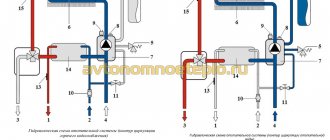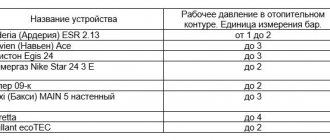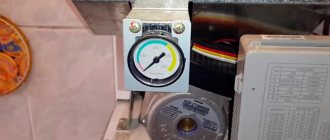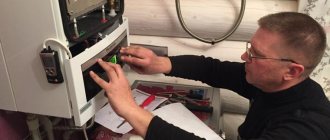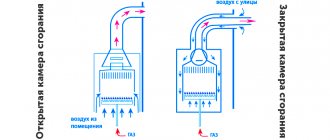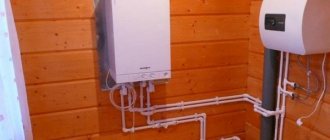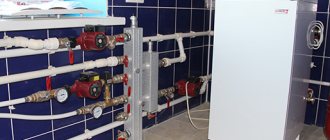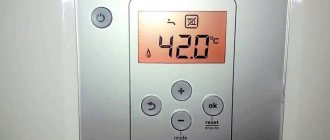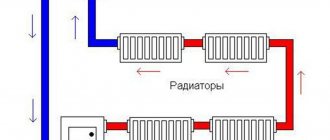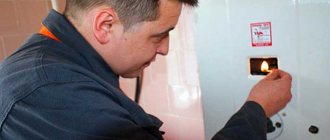Normally, the boiler should operate absolutely silently. The appearance of crackling, popping and noise indicates the presence of malfunctions in its operation. The reasons can be very diverse. Each individual case will require an individual approach to solving the problem.
Causes of noise and boiler hum
When noises occur
The new boiler operates almost silently, no louder than a household kettle. But sometimes, over time, if the components are incorrectly installed, configured or worn out, the device beeps quietly or even makes noise like an airplane.
Loud noises in the heating boiler disturb users; the reasons may be the following:
- The water in the system is highly oxygenated. When heated, air bubbles are released which produce noise. This happens most often in open heating systems. At the same time, not only the device itself vibrates, but also the wall radiators.
- The boiler puffs if a lot of air has accumulated in the coolant system.
- Scale in the heat exchanger. If the water is hard, over time lime will build up on the walls of the radiator pipes.
This also reduces equipment durability and efficiency. A sign of scale accumulation is that the device hisses like a kettle when it warms up.
- Strong noise can be produced by an incorrectly operating fan designed to remove combustion products. This can be caused by drying out of the lubricant inside its bearings, imbalance, or accumulation of dust and dirt on and around the blades.
- Perhaps it is not configured correctly, and that is why the gas valve or bypass is howling.
Bypass installation example - When operating at high power, a faulty gas meter rattles.
- If the equipment power exceeds the required, vibration occurs from excess pressure created by the pump. The device also cracks if there is too little coolant in the system.
- Often a loose valve or a valve inside it rattles.
Temperature deformation of the heat exchanger
Most often, this occurs in inexpensive boilers where the walls of the heat exchanger are thin. Therefore, during heating and cooling, extraneous sounds may be heard due to natural reasons. High-quality components are made well, so temperature fluctuations in them are not so pronounced.
It is unlikely that such a problem will be eliminated; it is worth making sure that the sounds do not intensify over time, as this may indicate severe deformation of the structure and cause a leak of hot coolant.
Reasons for the formation of sounds and pops
Sharp sounds and pops have the following causes:
Semi-automatic boiler wick
Clicking when turned on
Why does a gas boiler click? A faulty three-way valve is one of the reasons. This part serves to switch the operation of the unit from heating hot water supply (DHW) to heating, and vice versa. If it is faulty, it must be replaced. It cannot be repaired.
A loud bang occurs when the spark ignites for a long time. It is necessary to diagnose the unit: burner, igniter, electrode, contacts and connections.
- Wick clogged . When turned on, a popping sound is heard. This indicates that the chimney or wick is clogged. This feature is inherent in semi-automatic units. Inspection and cleaning of the wick is necessary.
If the chimney is clogged, there will be problems with draft. You can check it in a simple way:
- Light a match and bring it to the ventilation.
- If the flame tilts, there are no problems with draft; if it burns evenly, there is no draft, the chimney is clogged.
- The injectors are clogged . When heating, the device makes noise, ignition does not occur. Turn off the gas supply and clean the holes with a thin wire.
- Incorrect installation . When exposed to high temperatures, the metal expands, and when cooled it returns to its original position. When the heating is turned on, the pipes expand under the influence of hot water, and clicking sounds occur as they heat up. To do this, prudent craftsmen create a hole for thermal expansion.
- The heat exchanger plates are clogged . Dust, soot, and soot accumulate in them. This can lead to an explosion of the boiler. To remove soot, you will need to remove the boiler body and clean it. In addition, the mesh at the bottom of the boiler can become clogged with dust.
- Problems with the circulation pump . To get rid of the problem, turn off the gas valve before starting work.
How to avoid noise
It is important to turn off the gas before making any repairs. If you suddenly feel that you smell of gas, immediately turn off the tap at the entrance to the house, turn off electrical appliances, ventilate and call the gas service.
During installation, you can install an elastic vibration-absorbing layer under the casing in all places where the boiler comes into contact with the wall.
Boiler cleaning
First of all, it is important to carry out regular maintenance of heating equipment, which includes cleaning components, removing dust and lubricating some elements. This will increase the lifespan of your boiler and eliminate noise before it even occurs.
In a closed system, you need to add water from time to time, monitoring the pressure gauge. In some devices, for example, Visman Vitopend, it is displayed on the control panel at the bottom of the case.
Let's figure out what to do when the device is already making strange sounds:
- If the cause is oxygen saturation of the water, the problem can be solved by converting the open system to a closed one. To do this, air vents are installed on the water heating boiler and the expansion tank is replaced with a membrane one.
- The fan should be inspected and cleaned. It is important to note that the main blades are located inside the housing under the casing. After cleaning the dust and dirt, additionally lubricate its bearings. If this does not help, the cooler needs to be replaced.
- When the heat exchanger howls, you need to clean the scale inside it. In order to remove it, the casing is removed and the pipes connected to it are unscrewed. It is best to pour a special anti-scale chemical inside, which is sold in hardware stores, and leave it for several hours. If removing the heat exchanger is too difficult, the product is poured inside using a flexible hose.
- If the gas valve whistles, you need to check its settings. The correct configuration is written in the operating instructions.
Automatic gas valve - When the pump power exceeds the need of the system, it is necessary to reduce its speed by changing the position of the white switch under the cover on the terminal block.
- Air from the heating system is discharged through a brass air vent on the front panel of the device.
- If there is a popping noise when igniting in semi-automatic models with piezo ignition, such as Bosch W, clean the nozzle and pilot tube, which is ignited by the starter, from dust and clogging.
- When an automatic boiler, for example Ariston Genius, turns on with a loud bang, you should clean the ignition electrodes and, if necessary, adjust their location. After this, the fire will proceed quietly.
- Noise from valves can be prevented by replacing them with ball valves or installing an additional rubber gasket.
- To get rid of the fact that the gas meter is clicking, you need to call the gas service to check it. Most likely, you will have to replace the device.
- In order to eliminate metallic knocking when the temperature of the radiators changes, you should move the wall mounts to places that coincide with their support points. Putting rubber gaskets on the brackets also solves the problem.
- When heating pipes built into the wall ring, you need to lay a special insulating material called Merelon around them. It is advisable to think about this at the time of installation, so as not to spoil the repair later.
If it is difficult to localize the sound, let the boiler operate in different modes. For example, if you have a double-circuit device, for example Ferroli Atlas, and you don’t understand what and why it’s humming, turn off the hot water supply. Next, note at what time interval the extraneous sound appears, when the boiler is just starting up or at high temperatures, after it overheats.
We eliminate possible malfunctions of the Lemax Patriot boiler
_______________________________________________________________________________
Tell me how you can fix this problem. A Lemax Patriot 20 parapet gas boiler with an Eurosit 630 automation unit was installed. If you ignite, the main burner lights up well, but goes out within 10-20 seconds. The new launch does not change the situation. What could it be? Pre-check the thermocouple and draft sensor. Check the circuit contacts. Carefully dismantle the stationary pilot burner and clean it. Adjust the burner to lower gas pressure. We assume that the draft has deteriorated, as a result of which the pilot burner has a small amount of air during ignition of the main burner. The fire began to smoke thoroughly and the burner device burned non-stop, without dying out. The temperature does not rise above the set temperature while the flame is burning. There is a large coating of soot on the parts of the unit. The gas service says there is insufficient draft. How to fix the problem? The air flow has probably decreased. Maintenance needs to be done. Remove the burner assembly, clean and wash the burner and jets. The heat exchanger should be cleaned from the outside. Please tell us what the problem is if the device smokes? What should be done to resolve this issue? We assume that there is a weakening of thrust in the combustion chamber. We can advise you to clean the chimney duct. Tell me what to do if the Lemax Patriot 10 floor-standing boiler cannot ignite? I try to hold the control handle, click the ignition button, then hold it for about five minutes, release it, and the device goes out. Most likely the ignition tube is dirty. In such a situation, we recommend that you perform maintenance. There may also be oxide on the traction sensor terminals. Disconnect the clamps and clean them from oxidation. There is a problem with the Patriot 12.5 boiler with the 630 Eurosit automation device. When you press the ignition button, there is no gas supply to the burner mechanism. What could be the reason? When you press the button, fuel is supplied only to the igniter; it is not allowed to be supplied to the main gas burner device. This unit was installed. I don't like the cycle from pilot to main burner. Two pops are heard all the time. It should be? Most likely, it is necessary to adjust the automation according to gas pressure. We put into operation a similar unit with a Eurosit 630 gas valve, which does not want to function when the temperature rises to about 65 degrees. Am I asking for help to fix this problem? Most likely, the traction sensor starts to operate. We recommend that you have your chimney inspected. The same device has been in operation for five years. That week it experienced a heating failure at fifty degrees, although the fire continues to burn vigorously. What's happened? It looks like there is a blockage in the gas supply pipe from the automation unit on the gas burner device, and also in the burner nozzle. At home there is a gas boiler Lemax Patriot 16 with automatic Eurosit 630. Two days ago a problem appeared. It goes out when the wind blows on the igniter. Just recently I replaced the thermocouple, but the result was zero. How to fix it? When the main burner turns on, this leads to a decrease in the gas supply to the ignition mechanism, which means the automation unit must turn on. You need to increase the gas supply to the igniter. This usually happens due to low pressure in the system. In another case, a decrease in chimney draft occurred if it was installed incorrectly. Explain to me why this model periodically stops working, mainly when there are strong gusts of wind and bad weather outside. How should the issue be resolved? At the moment the ignition device is started, the solenoid valve should operate in approximately 20 seconds. When the igniter goes out, the EMC function is interrupted within ten seconds, at which time you will hear a click. Four years ago I installed a Lemax Patriot 12.5 parapet boiler at the dacha. The building is small, the area is no more than thirty square meters. You might think that the consumption is not too high, and the water does not heat up more than sixty-five degrees. The house has 2 radiators for ten sections. I don’t understand how to increase the heating temperature? To fix the problem, you need to install a circulation pump. Often there is a drop in pressure in the gas pipeline. For what reasons does boiler overheating often occur during operation? A significant factor is that circulation in the heating circuit has disappeared. It is also possible that the filter is clogged or there is a large accumulation of air in the heating system. I got into trouble. When we close the cold water tap and open the hot water tap, all the water leaves the heating circuit. Explain why this is so? It appears that the heating circuit's make-up valve is not functioning properly. It passes water through both pipelines. If there is coolant pressure in the system, then movement in the opposite direction cannot occur. Why does the device make noise, gurgle, and occasionally howl loudly and clap loudly? The water in the system is thoroughly enriched with oxygen. When heated, air evaporates, causing noise to be heard. If the unit settings are incorrect, the gas valve or bypass may howl. Popping noises during startup indicate a malfunction of the ignition mechanism. At the end of 2014, I independently launched the Lemax Patriot 12.5 boiler. Somewhere after a few months there was a glitch. I set the temperature, but it doesn’t hold it. Tell me, what is the reason? Apparently, there are problems with the automation, and when the temperature rises by 60 degrees, the nozzles turn off. It is necessary to configure the automation to perform the functions correctly. Another reason may be that the unit’s power has been selected inappropriately in relation to the areas that need to be heated. I installed this unit myself in the middle of this year. We made a conversion to liquefied gas. In just a few months, almost 10 cubic meters were consumed. At the moment there is a large amount of soot inside the unit, and the burner has started to smoke. What does this mean? Too much soot deposits in the firebox indicate that the burner is poorly adjusted, causing the fuel to not burn completely. It is also possible that the gas mixture is of poor quality. To prevent the burner from smoking, it is recommended to periodically carry out wet cleaning. I put this unit into operation. When starting, the burner device lights up and goes out immediately. It seems to me that the ignition device is faulty. How to fix this problem? You need to check whether the sound of the igniter sparking is heard when the cable is removed for ignition. If not, the ignition transformer must be replaced. If the sound appears, replace the igniter electrode or the burner itself. Recently there was a problem with the Patriot 20 boiler. Water began to flow. It worked properly for a total of 3 months. Maybe someone can explain why the water is dripping? It may drip due to high pressure in the heating system. There is also probably destruction of the walls of the heat exchange device. Water hammer can also cause leaks in boilers. I’m thinking of connecting this unit in a private house. I wonder what the standard gas supply pressure (methane/propane) should be for such devices? In this type of boiler devices, the standard gas supply pressure (natural/liquefied) is 150/300 Pa. I had the same device installed. The other day I noticed a problem with its operation. The boiler starts, but the heating does not heat. What is the problem? There may be an accumulation of air inside the radiators or a lot of scale in the heat exchanger. Try washing it. We use this unit in our apartment. It worked flawlessly until this evening. It is currently experiencing a malfunction. The device overheats every day. Can you help me fix this problem? It is possible that scale has built up, causing the duct to become clogged. You need to clean the device. The other day we had a problem with our heating boiler. The unit operated for only 3 weeks. After that, it suddenly stopped reaching the set temperature. Maybe someone can tell me why this happened? The gas pressure in the heating system is less than recommended. We need to inspect the gas valve. Most likely there is excess lubricant inside. The extra one needs to be removed. Explain how to properly pump up the expansion tank? The expansion tank is inflated with any available pump to the pressure recommended according to the passport. Basically the average volume is 1-1.5 bar. To pump up the expander, according to the regulations, you need to drain the coolant from the boiler. You can drain it through the drain fitting or through the water tap, turning off the influx of hot water supply. The Lemax Patriot 7.5 parapet gas boiler does not start. If you keep the start button pressed, the burner works normally. But if you don’t press the button, the device turns off. Can you tell me the reason for the breakdown? Most likely, the thermocouple is damaged or the gas valve is broken. There is also a decrease in gas pressure in the supply pipeline. Sometimes there is a lack of voltage on the control board. Please tell us what actions need to be taken to change the type of gas? To do this, it is recommended to change the main burner nozzles. Next, change the modulator supply voltage. And at the end, adjust the pressure parameter at maximum and minimum. What operating principle does the heating system safety valve use? Such a valve, adjusted to the operating pressure, serves the heating system. It is not permitted to use a safety valve to drain water from the system. The pressure of the heating system periodically increases. I reduce the pressure in the expansion tank to 2.2-2.4 atmospheres. Could it be that the heating system water comes from the hot water supply pipes? The rise in pressure in the heating system is formed by the following main factors. The pressure for the expansion tank is not set. The fill valve is leaking. There's a problem. The start is very bad. The pilot light is on, but there is no fire on the main burner. Please tell me what is the reason? It looks like the ignition device is faulty. You need to check the boiler and clean the ignition mechanism. Please help clarify the situation with the chimney duct? For two days now there has been a return draft, and smoke began pouring immediately into the kitchen. I did the chimney myself. It is a steel pipe. There must have been some mistake made. The main factor may be an incorrectly manufactured chimney duct design. Soot contamination is possible, which significantly reduces its efficiency. It is also advisable to check exhaust vents in residential areas.
_______________________________________________________________________________
_______________________________________________________________________________
_______________________________________________________________________________
- Gas boilers
- Electric boilers
- Boiler error codes
- Troubleshooting boilers
- Gas water heaters
- Malfunctions and repairs of geysers
- Water heaters
- Troubleshooting water heaters
- Repair of indirect heating boilers
- Troubleshooting electric convectors
_______________________________________________________________________________
_______________________________________________________________________________
- BAXI ECO FOUR
Heating system control. Installation. Connection. Transfer to another type of gas. Adjustment devices and protection devices.
- BAXI LUNA
Peculiarities. Installation and assembly. Automation components.
- BAXI MAIN FOUR
Technical specifications. Installation. Adjustment and checking. Maintenance.
- BAXI SLIM
Adjustment and protection. Installation and assembly. Pressure setting. Maintenance.
_______________________________________________________________________________
_______________________________________________________________________________
- BAKSI - REPAIR
After starting, a malfunction appeared. It doesn’t want to turn on, it worked for two years, now the whole display lights up, just like when the boiler is turned on, when the self-diagnosis mode is in progress, then it clicks, turns off for miles and seconds and turns on the whole display again. It turned on once, but it gives error E10 water pressure, although the pressure in the system is 1.5 atm. Tell me, what could it be?
- BAXI - OPERATION
In operation, the Baxi main four 240 boiler shuts down with error E35 (stray flame). Tell me what to do? First season in operation.
- BAXI - SETTINGS
We installed and connected the Baxi Fourtech 24 F boiler. What cold water pressure is allowed at the inlet to the DHW device?
- BOSCH - REPAIR
Bosch 6000 24 kW boiler, single-circuit with built-in three-way valve. The boiler sensor does not see it and gives an error. Tell me how to do it so that it doesn’t give an error and works normally for both the heating and the boiler?
- BOSCH - ADJUSTMENTS
If you turn off the DHW flow sensor, maybe it will be possible to reprogram it into a single-circuit device through menu L3?
- ARDERIA - REPAIR
We installed an Arderia esr 2.13 ffcd boiler. If my coolant pressure drops slightly by a couple of notches over 2-3 days, could the reason be a faulty three-way valve (there are no leaks from the radiators)?
- ARDERIA - ADJUSTMENTS
The gas boiler Arderia 2.35 is in operation. Tell me about reducing power. I heard something about modulation, fan speed, etc. Is it really possible to reduce power?
_______________________________________________________________________________
- BUDERUS FLOOR
We installed and connected the Buderus Logano G234-WS-44 kW boiler, automatic Logomatic 4211. Heating is based on cylinders without hot water, and the jets for reduced gas were also replaced. We survived the winter, the cylinders were replaced, all without problems. Then in the spring, when the outside temperature was +16+18, the boiler began to turn off for a long time and when turned on, it began to display a burner error on the screen and the red button light on the front wall came on. We pressed the button, turned the power back on and everything worked. This happened several times, then the boiler was turned off completely for the summer, what could be the problem?
- BUDERUS WALL
In the single-circuit Buderus 072, is the BKN coil circuit heated by the same heat exchanger as for heating or the same as on the 2-circuit one that is used for DHW?
- VAILLANT - REPAIR
Tell me, for Vaillant wall-mounted gas boilers, are there real/actual differences for the better in the new generation turboTEC plus VU/5-5 compared to /3-5?
- VAILLANT - ADJUSTMENTS
There is a malfunction in the boiler, the green LED (power) is flashing, the instructions say that the thermal protection has tripped, the green indicator is flashing, even if nothing is connected to the board. How to fix? I checked all SMD resistors and transistors, everything is fine.
- DAEWOO
In operation there is a double-circuit gas boiler Daewoo Gasboiler with an electronic panel. When the DHW is turned on, the heating heats up, the operating mode is summer. I removed the three-way valve, there is no dirt or wear. It seems that the board does not control the three-way valve. How to check?
- ELECTROLUX
The Electrolux Basic Xi wall-mounted boiler has been installed and connected. A problem began that the boiler stopped seeing the flame and turned off the gas supply after 7-8 seconds. And after 3 attempts it gave error E1. How can I fix it?
- KOREA STAR
Koreastar boiler malfunction. The heating works perfectly, the hot water comes intermittently, when you turn on the hot water tap, cold water comes out first, then boiling water. After a few seconds it’s cool, then boiling water again. What could be the problem?
- FERROLI
Malfunction of the Ferroli Domiproject 24 boiler - I set it to 60-70 degrees, it switches to minimum combustion, does not turn on, does not turn off. Restart is unstable. No pattern emerges. What to do?
- JUNKERS
In operation, a Junkers euroline gas boiler, when hot water is turned on, gas ignites, then goes out, and so on several times. If you turn it on while the heating is running, the water heating starts immediately. Tell me, please, what could be the problem?
- NAVIEN
Tell me about the adjustments of the gas boiler Navien Ace 16 turbo remote control v1.3. It is not possible to adjust the fan run-on. I set it to 30 seconds, but still 2 minutes. spins.
- OASIS
Malfunction of the Oasis ZRT18 boiler. The unit starts, the gas lights up, then goes out. It lights up again and then goes out (this happens three times). Then it lights up and works fine. It doesn't give any error. What is the reason?
- SAUNIER DUVAL
Malfunction of the Senor Duval gas boiler - the water pressure sensor shows 0.0, the indicator flashes red, the hot water does not heat up, but the water pressure in the apartment is good. How to fix the problem?
- VIESSMANN
Where should a condensate trap be installed in a coaxial chimney? The boiler wh1d with a closed combustion chamber is located at a distance of 1 m from the wall.
- WESTEN
Problem starting the Westen Pulsar D boiler. Piezo ignition works, but there is no flame, error E01 after a crackling sound. I moved the fork around.
- BERETTA
The Novella floor-standing gas boiler is blocked - the green lights on the panel are on and nothing else happens. How to fix?
- ARISTON
An Ariston gas wall-mounted boiler has been installed and connected, which does not hold pressure at all: while cooling the heated water, the pressure drops to zero, although water is regularly filled. What about the pressure?
- SIME
Metropolis dgt 25 bf boiler malfunction. The hot water supply has stopped working, the heating is working, it does not display an error. What do you advise?
- SOLLY
Please tell me how to solve the problem. The Solly Standard boiler, whenever you try to turn it on or hot water, displays a GS error.
- WOLF
Wolf boiler in operation. Lately it has begun to behave strangely: during the pause between starts, it turns on the burner for one second five times, and 70 degrees appears on the display. Where to look for a problem?
- ACV
ACV Wester Line works very unstable: it often crashes, makes a characteristic knock and stalls when starting, but at times everything is fine. The unit is almost new, what's wrong with it?
- DEMRAD
In the gas boiler Demrad, the gas supply to the burner stopped. The piezo element clicks, but there is no ignition. There is nothing wrong with the gas stove, there is gas. What is the reason?
- KITURAMI
The Kiturami world boiler is malfunctioning and stops periodically. I clean the flame sensor and the unit works fine for a while, but soon the same thing happens again. He also began to smoke heavily. Maybe the problem is that the chimney is short, and it needs to be lengthened?
_____________________________________________________________
- IMMERGAZ - ERRORS
Errors of Nike Star, Eolo Star/Mini, Mythos boilers. Malfunctions of boilers with the possibility of automatic unlocking.
- IMMERGAZ - REPAIR
My boiler systematically raises the temperature to 80 degrees in winter mode. I called the repairman three times. He said that many models have this problem and suggested installing a programmer, but it’s not certain that it will help. Tell me how to solve this problem and will this programmer help?
- AOGV
Models 11.6; 17.4; 23.2; 29.3 kW. Specifications. Control elements of the automation unit. Installation and maintenance. Malfunctions and their elimination.
- AOGV - REPAIR
The AOGV gas boiler was installed and put into operation. Problem with hot water supply. The heat exchanger was washed. Less than a month has passed and the water is not flowing again. We put a filter on the water, but time passed, and again there was no hot water. What kind of breakdown could this be?
- AGV
Installation and installation. Start-up and adjustment. Malfunctions and ways to eliminate them.
- AKGV
Technical specifications. Installation and connections. Startup and operating procedure. Automatic adjustments.
- NEVA LUX
The boiler Neva Lux 7023 is malfunctioning. It gives error E7 twice a month. But after reboot it still works. Now it gives error E6. It will work for 15 minutes and turn off. What could it be?
- ROSS
Design and automation unit. Ignition order. Malfunctions and repairs.
- ATEM ZHYTOMYR
Tell me, is it possible that due to low gas pressure the Atem Zhytomyr boiler goes out, a click occurs and goes out. What is the problem? Is it possible to temporarily disable automation and how?
- LEMAX
We installed a Lemax KSG-12.5 Premium gas boiler. After turning off the main burner, a clicking sound occurs after a couple of minutes, what is the reason? Tell me?
- KEBER
A KS-G gas boiler of 250 sq.m. was installed and connected. m. When ignited, it does not turn off, the temperature rises, if I am not mistaken, automatic Arbat 1. The flame is not regulated - it is too large. What to do?
- LIGHTHOUSE
I installed the Mayak gas boiler and connected it. It works fine. But the reason is this. When it works on unit it squeaks a lot, if you turn the knob 2-7 the squeak disappears. Tell me, what could it be?
- DANKO
We installed and connected a Danko gas boiler with automatic Kare, it works great on the igniter, but as soon as you add power to the burner, it goes out completely, yesterday it went out within 5 minutes, today it works for about 20 minutes and goes out completely. Has anyone encountered this problem?
- GAZLUX
The gaseko 18 boiler is in operation. When hot water is turned on, the pressure in the system drops after replenishment, the pressure reaches 3 bar. Have to reset. What's wrong, how to fix it?
- NOVA FLORIDA
Water often boils in the boiler, causing it to fail due to overheating. The heat exchanger was recently washed, the system is not clogged. What's the matter?
- RINNAI
Rinnai 167 RMF boiler malfunction. Recently I started showing error 14. How can I fix the problem?
- CELTIC
The Celtic DS boiler heats up to 45 degrees and sits all day, does not turn off and does not heat the batteries, sometimes it shows error A3. How can I fix this problem?
- MORA
The hot water pressure in the Mora Top boiler has dropped. What is the reason?
- MASTER GAS SEOUL
The Seoul gas wall-mounted boiler stopped turning on due to a no-ignition error. How can it be eliminated? What exactly went wrong?
Causes of noise
There are actually not so many reasons for knocking in heating pipes when heating. Some noise can be ignored - it does not harm the system or heating devices. But noises such as buzzing, crackling, knocking, gurgling, and howling should give reason to think and take urgent action.
- air pockets in the system;
- clogging or overgrowing of pipes due to poor-quality coolant;
- leaks in the pipeline;
- violation of installation work when installing taps, valves and laying pipes;
- failure or wear of working equipment;
- cavitation, an increase in pressure in places where the diameter of pipes increases (decreases);
- incorrect calculation or non-compliance with design recommendations when installing the heating system.
These circumstances arise in private closed-loop systems and make us think about their urgent elimination.
The circulation pump in the heating circuit system promotes forced movement of water, which leads to uniform heating and displacement of accumulated air from the system.
If the heating in a house or apartment is connected to a central pipeline, then startup, accompanied by similar sounds, is normal. Water, filling the general system, pushes out air, and, flowing along the contour, is accompanied by gurgling, knocking and crackling sounds.
As soon as the equipment enters operating mode, the general adjustment of the system will end - the temperature of the batteries will increase, and everything will stop. This is clearly visible in the diagram of heat supply to consumers from the central boiler house.
Why do you hear clicking, crackling and knocking noises?
The appearance of clicking or crackling noises in the heating system pipes usually indicates that foreign solid particles have appeared inside the communications. The impact of such small particles on the pipe walls is the direct cause of such noise.
As a rule, heating pipes knock and click when the following problems occur:
- wear of some key elements of the system;
- valve valve malfunctions;
- expansion of metal heating pipes under the influence of heat.
In most cases, knocking in the heating pipes of a private house or apartment building can be eliminated by simply draining the clogged water from the heating system and replacing it with clean water. If such flushing does not eliminate noise, then the faulty parts of the system must be replaced. In particular, valve valves are subject to inspection, problems with which are often the cause of such noise.
Another reason for knocking in heating pipes may be the thermal expansion of metal pipeline structures. Usually in this case, the crackling and knocking noises are quiet and intermittent. The expansion of pipes can lead to slight movements and disruption of the fastening of some structural elements, which leads to noise of this kind. To solve this problem, it is necessary to inspect the places where various parts and elements are fixed, and, if necessary, re-fasten them.
Finally, another reason that can lead to clicking and knocking in heating pipes is the so-called water hammer. It occurs when the water circulating in the pipes is instantly shut off by closing the valve, valve or tap. Since the compressibility of water is practically zero, and stopping the water stream cannot happen immediately, for a short time, at the point where the tap is suddenly closed, the pressure can jump by tens of atmospheres. This can lead to malfunctions of valves, valves, threaded connections with clicking or crackling sounds, and even failure of some parts. Therefore, to avoid this, you should not suddenly shut off the flow of liquid circulating in the heating system.
Types of noise in pipes
The noises that accompany the general heating start-up differ from emergency ones - they are intermittent and are accompanied by gurgling or gurgling. In bimetallic or aluminum batteries, a crackling or buzzing noise may be heard - this is also normal.
It is clear that prolonged noise is unpleasant, so it is necessary to prevent the situation in a timely manner.
The knocking and hum that occurs in the room with increasing force give reason to be wary and take drastic measures:
- Check heating devices and temperature conditions in the circuit. If a pump is installed, then its operation.
- Pay attention to the valves - if they break, a characteristic whistle appears. Sometimes a small adjustment is all it takes to get the equipment working.
- Having discovered visible problems, you need to stop the coolant and turn off the heating devices. Having assessed the breakdown, proceed to eliminate the accident yourself or invite a specialist.
These are primary measures that can prevent the development of major destruction.
Sounds from heating devices
If you hear a howl in the middle of the night, then most likely the system has leaked. A cloud of steam and a characteristic whistle will immediately indicate a gust or a failed valve. In some cases, it is enough to close the tap to bring the heating system into working condition.
If no obvious causes are found, and the howling is accompanied by a crackling sound, it is necessary to check the pressure. Perhaps the flying scale blocked the free flow of the coolant, which caused increased pressure - it is urgent to stop the boiler, drain the water and look for the problem.
It happens that the batteries start to “shoot” - this is another reason to be wary. Such noise is typical for bimetallic batteries when the pressure in the system does not coincide with the calculated one.
When purchasing heating appliances, you need to take into account the operating parameters of the boiler and select the appropriate radiator. Otherwise, the problem may result in a rupture of the heating device due to water hammer, which is completely inappropriate in the winter cold.
Heated water is not able to compress; it needs to move freely along the contour. Banal deposits in pipes can provoke an increase in pressure and rupture of pipes due to water hammer.
Another reason is an air lock, which can be eliminated through the Mayevsky drain valves located at the ends of the batteries. The procedure is simple, and anyone can handle it.
What can cause clicking noises?
If the gas boiler clicks, you need to try to find the reason. If the equipment is used incorrectly, it becomes dangerous. Therefore, if extraneous sounds appear, it is necessary to carry out diagnostics, identify the source of the sound and eliminate the defect yourself or with the help of a specialist.
Burner installed incorrectly
If the burner is ringing, the reason may be hidden in incorrect installation.
To ensure that the part is in good condition, it is recommended to check the pressure level of the gas exiting the burner.
You can find out the required indicators in the instructions for the device. If they do not meet the standards, the burner must be adjusted.
The appliance is noisy when heating water
Noise may appear when the water is heating up. This situation can be caused by incorrect installation or configuration of equipment. Therefore, you should check whether the device’s performance meets the standards specified in the instructions for the device.
Worn parts can lead to these problems when heated. Then it is necessary to replace the failed elements. Sometimes when water is heated, noise occurs due to high oxygen content. Because of this, as the temperature rises and the liquid heats up, bubbles begin to appear. Which leads to the appearance of various unusual sounds and vibrations of the boiler.
Excess pressure in the heating pump
A pump is necessary to create high pressure in the device. Therefore, if it fails, its operation must be adjusted. Increasing system pressure can cause a dangerous situation. If the water level drops, this will cause the equipment to overheat. The thermostat needs to be adjusted. In some situations, they add water to the device themselves.
If the boiler makes sounds similar to howling, the problem may be hidden in the settings of the gas valve.
It is necessary to adjust it and check the jumpers. The increase in power is related to the gas meter. The valve may also wear out. This results in loud noises when the equipment operates. The valve needs to be changed immediately. If the noise does not decrease after this, then ball valves are installed in place of the valves. Additionally, it is recommended to equip the device with a rubber gasket. When these measures do not help, the cooler is replaced.
Pump noise
A common cause of problems is pump operation. Typically, it has three positions to raise the water column to a certain height, which depends on the power of the device. The uniform movement of the coolant along the thermal circuit is not accompanied by noise effects.
If you hear strange sounds that sound more like mechanical sounds, you should check the operation of the pump.
In case of failure:
- water gurgles in the heating pipes of a private house;
- a hum appears;
- cracking is possible;
- The boiler begins to make noise and knock.
In this case, you need to turn off the pump, and if the sounds stop, then the cause has been found. Cracking and noise are mechanical damage: this means that the graphite sliding bearings have worn out or dirt has gotten into the housing.
Scale settles on the inner walls of the pump due to poor-quality coolant and has a destructive effect on its components.
Checking is simple:
- it is enough to remove the pump;
- lower its working part into a container of water;
- when turned on, it must pump water; if this does not happen, it must be repaired.
Important! The pump cannot be turned on without water.
Extraneous sounds in the heating boiler
Sometimes the heating of the boiler is also accompanied by some sounds. When cold equipment heats up and begins to crack, the characteristic clicks should not cause panic - metal makes such sounds when it warms up.
Gurgling and gurgling are also possible - this is also a normal phenomenon: the coolant began to heat up and set the system in motion. However, the same sounds can occur if there is insufficient coolant in the pipes. In this situation, it is enough to add water to ensure uniform heating.
Cotton
You can hear such sounds if the gas outlet pipes are clogged. This happens when the boiler is ignited: the accumulated gas, without having time to escape, creates a bang. This is dangerous, as a sudden burst of flame can cause burns or fire.
If the boiler is gas, then the reasons for such noise are clogged nozzles or a malfunction of the three-way valve. In this situation, it is necessary to clean the equipment from soot.
The occurrence of a knocking sound in the boiler indicates its incorrect installation or unregulated operation of the pumping equipment. If the pump operates unevenly, moving the coolant in jerks, resonance occurs between the boiler and the pump, accompanied by a characteristic knocking sound. In this case, it is necessary to regulate the operation of the pump.
Sounds in different boiler models
Noise can occur for a trivial reason, which lies in the boiler model itself. This is typical for gas boilers equipped with ventilation burners. To avoid such trouble, you need to choose boilers with atmospheric burners and an electronic control system.
When choosing a solid fuel or electric boiler model for heating your home, you should always familiarize yourself with the technical characteristics of the equipment. Often the cause of noise can be incorrectly selected equipment, as well as the presence of a fan in the boiler.
Double-circuit boilers also suffer from noisy operation: although not obvious, water overflows and filling of the system are always accompanied by sounds.
The gas boiler hums and whistles
A gas boiler can make noise throughout the entire apartment, thereby interfering with sleep. Is it possible to get rid of this noise? In fact, the cause of the noise lies in the chimney. In this case, the chimney needs to be enlarged and expanded. The narrower it is, the stronger the rumble.
Operating principle of combined heating boilers
Often the gas boiler begins to hum loudly. The reason is the stabilization system, which regulates the level of gas pressure that enters the combustion compartment. To prevent sounds from interfering with a comfortable existence, it is better to locate the boiler room away from the living space. If it has already been built next to your home, you can solve the issue by ensuring soundproofing of the room. There are a great variety of materials for this.
If the boiler starts to boil like an electric kettle, it means the primary heat exchanger is clogged. Finding out whether there is a blockage is quite simple. You need to set the boiler to the maximum temperature and turn on the supply valve so that there is a small flow of water. At around 80 degrees the hum increases. There is only one way out - clean the heat exchanger.
How to remove an air lock with your own hands
Air in the system after a long stop is common. This problem arises not only in the private sector, but also in apartment buildings. It's quite easy to solve.
Heating radiators are equipped with Mayevsky taps located at the ends of the radiators. This could be a valve or a fitting with a notch for a screwdriver.
- armed with a small container (for draining water), you need to unscrew the tap and let out the air;
- Actions should be performed carefully so as not to get burned by the escaping steam;
- when water comes out of the hole, close the valve;
- Such manipulations are carried out on each battery.
This eliminates noise and allows the coolant to move freely through the system, evenly releasing heat.
Methods for cleaning radiators from dirt
During operation of the heating system, dirt accumulates in it: iron oxides, dissolved salts and possible mechanical impurities. But if water moves through the pipes at high speed, then in the radiators the process slows down and the sedimentation of suspended matter increases. Therefore, cleaning radiators is a must.
There are two methods: flushing the entire system together and disconnecting the batteries and cleaning using a compressor unit. Favorable conditions are created in the batteries for the accumulation of dirt, since the coolant slows down the movement in them. To flush, the radiator is connected to the compressor, and dirt is cleaned from it with water pressure.
If you carry out annual preventive maintenance of the entire system, then drastic measures will not be required. It is quite possible to limit yourself to a general flushing of the entire heating circuit with ordinary water. Chemical reagents are used in cases where the coolant does not meet the established parameters and significant deposits of salts and scale appear on the working elements.
After using chemicals, leaks may form in radiators and cracks may appear that were successfully covered with dirt.
To avoid an emergency, all equipment must be checked for functionality before starting the system.
Timely preventive maintenance of all components of the heating system will protect it from complex accidents and save the budget.
Video
By watching the video, you can find out why the circulation pump is noisy and what needs to be done.
Evgeniy Afanasyev chief editor
Author of publication 08.11.2018
Did you like the article? Save so you don't lose!
Knocking in the heating pipes of a private home is a common occurrence for owners with individual heating. Why the noise occurs and what influences it is necessary to understand.
The main indicator of trouble is poor-quality coolant containing dissolved salts and mechanical impurities.
Causes of noise
There are actually not so many reasons for knocking in heating pipes when heating. Some noise can be ignored - it does not harm the system or heating devices. But noises such as buzzing, crackling, knocking, gurgling, and howling should give reason to think and take urgent action.
- air pockets in the system;
- clogging or overgrowing of pipes due to poor-quality coolant;
- leaks in the pipeline;
- violation of installation work when installing taps, valves and laying pipes;
- failure or wear of working equipment;
- cavitation, an increase in pressure in places where the diameter of pipes increases (decreases);
- incorrect calculation or non-compliance with design recommendations when installing the heating system.
These circumstances arise in private closed-loop systems and make us think about their urgent elimination.
The circulation pump in the heating circuit system promotes forced movement of water, which leads to uniform heating and displacement of accumulated air from the system.
If the heating in a house or apartment is connected to a central pipeline, then startup, accompanied by similar sounds, is normal. Water, filling the general system, pushes out air, and, flowing along the contour, is accompanied by gurgling, knocking and crackling sounds.
As soon as the equipment enters operating mode, the general adjustment of the system will end - the temperature of the batteries will increase, and everything will stop. This is clearly visible in the diagram of heat supply to consumers from the central boiler house.
What to do if water boils in the batteries
You can often hear sounds such as gurgling water, even intense seething. As a rule, this is due to the presence of so-called air locks. They are looking for a way out - as a result of which the water in the system can boil. Moreover, this not only leads to discomfort, but also to the fact that the efficiency of the coolant decreases, since, as is known, the thermal conductivity of air is worse than that of water. In order to eliminate air pockets, special taps are often installed at the upper levels of the heating system, through which excess air is released.
Mayevsky tap is a device for releasing air from central water heating radiators, opened using a special key or screwdriver.
Types of noise in pipes
The noises that accompany the general heating start-up differ from emergency ones - they are intermittent and are accompanied by gurgling or gurgling. In bimetallic or aluminum batteries, a crackling or buzzing noise may be heard - this is also normal.
It is clear that prolonged noise is unpleasant, so it is necessary to prevent the situation in a timely manner.
The knocking and hum that occurs in the room with increasing force give reason to be wary and take drastic measures:
- Check heating devices and temperature conditions in the circuit. If a pump is installed, then its operation.
- Pay attention to the valves - if they break, a characteristic whistle appears. Sometimes a small adjustment is all it takes to get the equipment working.
- Having discovered visible problems, you need to stop the coolant and turn off the heating devices. Having assessed the breakdown, proceed to eliminate the accident yourself or invite a specialist.
These are primary measures that can prevent the development of major destruction.
Sounds from heating devices
If you hear a howl in the middle of the night, then most likely the system has leaked. A cloud of steam and a characteristic whistle will immediately indicate a gust or a failed valve. In some cases, it is enough to close the tap to bring the heating system into working condition.
If no obvious causes are found, and the howling is accompanied by a crackling sound, it is necessary to check the pressure. Perhaps the flying scale blocked the free flow of the coolant, which caused increased pressure - it is urgent to stop the boiler, drain the water and look for the problem.
It happens that the batteries start to “shoot” - this is another reason to be wary. Such noise is typical for bimetallic batteries when the pressure in the system does not coincide with the calculated one.
When purchasing heating appliances, you need to take into account the operating parameters of the boiler and select the appropriate radiator. Otherwise, the problem may result in a rupture of the heating device due to water hammer, which is completely inappropriate in the winter cold.
Fan problems
The fan operates in models with a closed chamber and forced removal of combustion products. Why does it make strange sounds when rotating, whistling:
Fan malfunctions can often occur. Then, when rotating, it can cause various extraneous sounds. The cause may be insufficient lubrication. The lubricant tends to dry out quickly due to exposure to high temperatures. As a result, the bearings fail.
The accumulation of dirt and dust in the blades is another cause of squeaking. The fan needs to be removed and cleaned.
The accumulation of dirt and dust in the blades is another cause of squeaking. It is necessary to clean them to get rid of squeaking when rotating. The fan is used for the smoke exhaust function and also removes residual gas combustion products.
Pump noise
A common cause of problems is pump operation. Typically, it has three positions to raise the water column to a certain height, which depends on the power of the device. The uniform movement of the coolant along the thermal circuit is not accompanied by noise effects.
If you hear strange sounds that sound more like mechanical sounds, you should check the operation of the pump.
In case of failure:
- water gurgles in the heating pipes of a private house;
- a hum appears;
- cracking is possible;
- The boiler begins to make noise and knock.
In this case, you need to turn off the pump, and if the sounds stop, then the cause has been found. Cracking and noise are mechanical damage: this means that the graphite sliding bearings have worn out or dirt has gotten into the housing.
Scale settles on the inner walls of the pump due to poor-quality coolant and has a destructive effect on its components.
Checking is simple:
- it is enough to remove the pump;
- lower its working part into a container of water;
- when turned on, it must pump water; if this does not happen, it must be repaired.
Important! The pump cannot be turned on without water.
Extraneous sounds in the heating boiler
Sometimes the heating of the boiler is also accompanied by some sounds. When cold equipment heats up and begins to crack, the characteristic clicks should not cause panic - metal makes such sounds when it warms up.
Gurgling and gurgling are also possible - this is also a normal phenomenon: the coolant began to heat up and set the system in motion. However, the same sounds can occur if there is insufficient coolant in the pipes. In this situation, it is enough to add water to ensure uniform heating.
Cotton
You can hear such sounds if the gas outlet pipes are clogged. This happens when the boiler is ignited: the accumulated gas, without having time to escape, creates a bang. This is dangerous, as a sudden burst of flame can cause burns or fire.
If the boiler is gas, then the reasons for such noise are clogged nozzles or a malfunction of the three-way valve. In this situation, it is necessary to clean the equipment from soot.
The occurrence of a knocking sound in the boiler indicates its incorrect installation or unregulated operation of the pumping equipment. If the pump operates unevenly, moving the coolant in jerks, resonance occurs between the boiler and the pump, accompanied by a characteristic knocking sound. In this case, it is necessary to regulate the operation of the pump.
Sounds in different boiler models
Noise can occur for a trivial reason, which lies in the boiler model itself. This is typical for gas boilers equipped with ventilation burners. To avoid such trouble, you need to choose boilers with atmospheric burners and an electronic control system.
When choosing a solid fuel or electric boiler model for heating your home, you should always familiarize yourself with the technical characteristics of the equipment. Often the cause of noise can be incorrectly selected equipment, as well as the presence of a fan in the boiler.
Double-circuit boilers also suffer from noisy operation: although not obvious, water overflows and filling of the system are always accompanied by sounds.
ZOTA boilers are very sensitive to the quality of the coolant, so unpleasant effects can be caused by:
- clogged mud trap;
- oxygenated water;
- scale on working elements;
- Broken bearings on the fan.
Therefore, it is worth choosing single-circuit models and purchasing a boiler to heat hot water.
Prices for ZOTA boilers
Prevention
Timely prevention of all components of boiler equipment can minimize the likelihood of noise.
Thus, flushing the system once a year is a prerequisite for trouble-free operation. Moreover, this is becoming a mandatory requirement of many resource supply organizations in preparation for the heating season.
You can flush the system yourself or use the services of specialists.
Depending on the coolant, the type of cleaning is selected:
- Washing with water under pressure generated by the compressor. Sometimes this is enough.
- For iron oxide deposits on pipes, appropriate chemicals are used. They eliminate the problem and additionally create a protective barrier from further exposure to an aggressive environment.
- You can use the services of a specialized organization that has the equipment and tools to perform the work.
Each operating manual for heating equipment provides a recommendation for preventive inspection and cleaning of the working parts of the boiler from corrosion and all kinds of contaminants with partial disassembly - at least once a year. If maintenance is not carried out, the manufacturer withdraws its warranty obligations.
If the boiler makes noise during operation
If you hear noise while the gas boiler is on, it means there are certain problems. First you need to discover the reasons, and then begin the process of getting rid of the annoying sound:
- Water may make noise in the pipes. This may indicate a malfunction in the heating supply. If action is not taken to correct the situation in time, some heating element may fail.
- Extraneous sounds - noise, clicks in the heating radiator or radiators significantly worsen the quality of living in the apartment. If the heating pump or other system component is noisy, we advise you to first try to localize the cause of the extraneous sounds. To do this you need:
- Trace the periodicity and frequency of occurrence of various sounds.
- Try to trace exactly when the sounds occur - with an increase/decrease in temperature or pressure.
- Make sure that the source of the sounds is the boiler and not other equipment in the boiler room.
Character of noise
Pay attention to the noise, but it could be:
- Uniform monotonous.
- Uneven, with a crash.
Uniform noise can occur even when operating a new, recently installed boiler, but the second one can occur only after some time.
Is the noise in a gas boiler dangerous?
No, not dangerous. There will also be no defects or threats to operation in the heating system. Noise can only create discomfort in living rooms.
How to get rid of noise?
The only option to get rid of noise in a working boiler is to reinstall the system from open to closed. Reworking the system will not affect the ability of it to operate without a pump. In addition, there will be an excellent opportunity to install an auto-recharge system and a weather-sensitive automatic system.
Lime deposits: the cause of noise in the boiler
Often, extraneous sounds do not appear immediately, but after a certain period of operation of the device. Why does the boiler make noise in this case? The thing is that lime deposits cause noise. They form on the walls of the heat exchanger after a certain period of operation.
Why is the gas boiler still clicking? The cause may be lime deposits. They cover the walls of the heat exchanger from the inside, due to which the temperature of the internal walls of the heat exchanger begins to increase sharply, which also affects how long the equipment can last. In this case, we will hear clicks, knocks, and noises.
It is necessary to carry out maintenance of the boiler at regular intervals, regularly clean the device from soot, scale, dust, and dirt. This will significantly increase the service life of the boiler and prevent problems with its operation.
How to remove an air lock with your own hands
Air in the system after a long stop is common. This problem arises not only in the private sector, but also in apartment buildings. It's quite easy to solve.
Heating radiators are equipped with Mayevsky taps located at the ends of the radiators. This could be a valve or a fitting with a notch for a screwdriver.
- armed with a small container (for draining water), you need to unscrew the tap and let out the air;
- Actions should be performed carefully so as not to get burned by the escaping steam;
- when water comes out of the hole, close the valve;
- Such manipulations are carried out on each battery.
This eliminates noise and allows the coolant to move freely through the system, evenly releasing heat.
Causes of clicking noises
Below are the main and most common sparks experienced by housewives:
- Lime formation.
- The thermal balance inside the boiler is disrupted.
- The appearance of various damage to one or more elements of the entire system.
As for the rest, these are variations of the main ones.
IMPORTANT. Of course, if you are unsure of the correct detection of the source of the defect, it is advisable to contact a special service. Qualified specialists will be able not only to make a diagnosis in a timely manner, but also to eliminate it themselves.
Methods for cleaning radiators from dirt
During operation of the heating system, dirt accumulates in it: iron oxides, dissolved salts and possible mechanical impurities. But if water moves through the pipes at high speed, then in the radiators the process slows down and the sedimentation of suspended matter increases. Therefore, cleaning radiators is a must.
There are two methods: flushing the entire system together and disconnecting the batteries and cleaning using a compressor unit. Favorable conditions are created in the batteries for the accumulation of dirt, since the coolant slows down the movement in them. To flush, the radiator is connected to the compressor, and dirt is cleaned from it with water pressure.
If you carry out annual preventive maintenance of the entire system, then drastic measures will not be required. It is quite possible to limit yourself to a general flushing of the entire heating circuit with ordinary water. Chemical reagents are used in cases where the coolant does not meet the established parameters and significant deposits of salts and scale appear on the working elements.
After using chemicals, leaks may form in radiators and cracks may appear that were successfully covered with dirt.
To avoid an emergency, all equipment must be checked for functionality before starting the system.
Timely preventive maintenance of all components of the heating system will protect it from complex accidents and save the budget.
